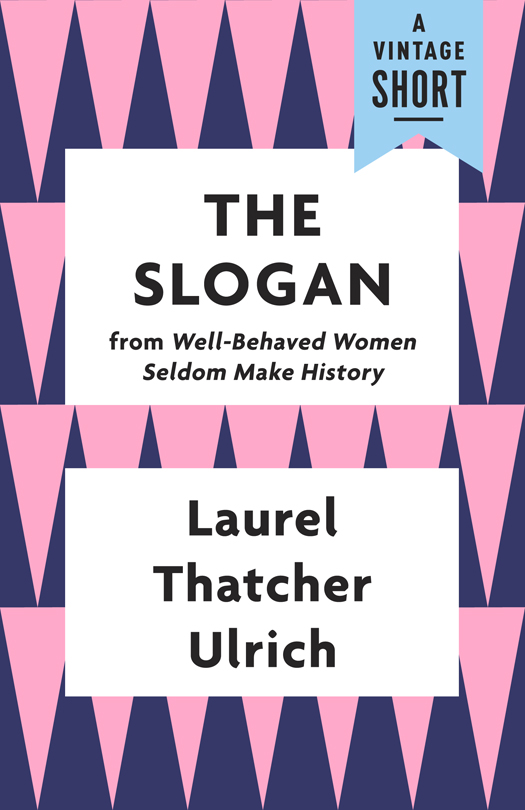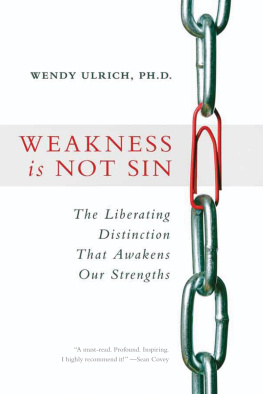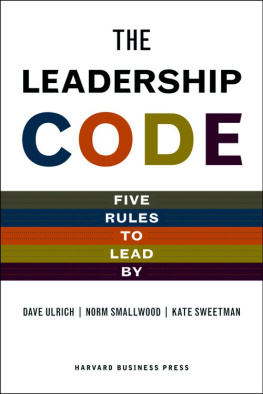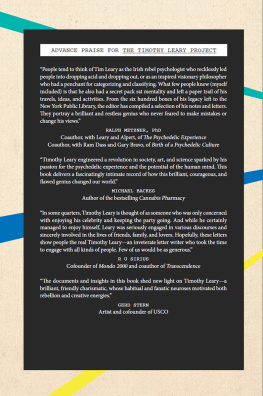Ulrich - The slogan
Here you can read online Ulrich - The slogan full text of the book (entire story) in english for free. Download pdf and epub, get meaning, cover and reviews about this ebook. year: 2015, publisher: Vintage Books, genre: Romance novel. Description of the work, (preface) as well as reviews are available. Best literature library LitArk.com created for fans of good reading and offers a wide selection of genres:
Romance novel
Science fiction
Adventure
Detective
Science
History
Home and family
Prose
Art
Politics
Computer
Non-fiction
Religion
Business
Children
Humor
Choose a favorite category and find really read worthwhile books. Enjoy immersion in the world of imagination, feel the emotions of the characters or learn something new for yourself, make an fascinating discovery.

- Book:The slogan
- Author:
- Publisher:Vintage Books
- Genre:
- Year:2015
- Rating:4 / 5
- Favourites:Add to favourites
- Your mark:
- 80
- 1
- 2
- 3
- 4
- 5
The slogan: summary, description and annotation
We offer to read an annotation, description, summary or preface (depends on what the author of the book "The slogan" wrote himself). If you haven't found the necessary information about the book — write in the comments, we will try to find it.
The slogan — read online for free the complete book (whole text) full work
Below is the text of the book, divided by pages. System saving the place of the last page read, allows you to conveniently read the book "The slogan" online for free, without having to search again every time where you left off. Put a bookmark, and you can go to the page where you finished reading at any time.
Font size:
Interval:
Bookmark:

Laurel Thatcher Ulrich received her B.A. from the University of Utah, her M.A. from Simmons College, and her Ph.D. from the University of New Hampshire. She was previously Professor of History at the University of New Hampshire and is currently Phillips Professor of Early American History and 300th Anniversary University Professor at Harvard University. Her book A Midwifes Tale won the Pulitzer Prize in History, the Bancroft Prize, and the American Historical Societys John H. Dunning and Joan Kelly Memorial Prizes. Ulrichs discovery of Martha Ballard and work on the diary has been chronicled in a documentary film written and produced by Laurie Kahn-Leavitt with major funding from the National Endowment for the Humanities and the American Experience television series. Ulrich is also the author of numerous articles and reviews and the recipient of a MacArthur Foundation Fellowship and many other honors and awards.
The Slogan
from Well-Behaved Women Seldom Make History
Laurel Thatcher Ulrich
A Vintage Short
Vintage Books
A Division of Penguin Random House LLC
New York
Copyright 2007 by Laurel Thatcher Ulrich
All rights reserved. Published in the United States by Vintage Books, a division of Penguin Random House LLC, New York, and simultaneously in Canada by Random House of Canada, a division of Penguin Random House Ltd., Toronto. Originally published in hardcover in the United States as part of Well-Behaved Women Seldom Make History by Alfred A. Knopf, a division of Penguin Random House LLC, New York, in 2011.
Grateful acknowledgment is made to Kacey Jones for permission to reprint an excerpt from Well-Behaved Women Rarely Make History by Kacey Jones, copyright 2003 by Mamalama Music Publishing Company, Inc. (ASCAP). Reprinted by permission of Kacey Jones.
The Cataloging-in-Publication Data for Well-Behaved Women Seldom Make History is available from the Library of Congress.
Vintage eShort ISBN: 978-1-101-96989-2
Series cover design by Joan Wong.
www.vintagebooks.com
v3.1
Some time ago a former student e-mailed me from California: Youll be delighted to know that you are quoted frequently on bumpers in Berkeley. Through a strange stroke of fate Ive gotten used to seeing my name on bumpers. And on T-shirts, tote bags, coffee mugs, magnets, buttons, greeting cards, and websites.
I owe this curious fame to a single line from a scholarly article I published in 1976. In the opening paragraph, I wrote: Well-behaved women seldom make history. That sentence, slightly altered, escaped into popular culture in 1995, when journalist Kay Mills used it as an epigraph for her informal history of American women, From Pocahontas to Power Suits. Perhaps by accident, she changed the word seldom to rarely. Little matter. According to my dictionary, seldom and rarely mean the same thing: Well-behaved women infrequently, or on few occasions, make history. This may be one of those occasions. My original article was a study of the well-behaved women celebrated in Puritan funeral sermons.
In 1996, a young woman named Jill Portugal found the rarely version of the quote in her roommates copy of The New Beacon Book of Quotations by Women. She wrote me from Oregon asking permission to print it on T-shirts. I was amused by her request and told her to go ahead; all I asked was that she send me a T-shirt. The
Her success inspired imitators, only a few of whom bothered to ask permission. My runaway sentence now keeps company with anarchists, hedonists, would-be witches, political activists of many descriptions, and quite a few well-behaved women. It has been featured in CosmoGirl, the Christian Science Monitor, and Creative Keepsake Scrapbooking Magazine. According to news reports, it was a favorite of the pioneering computer scientist Anita Borg. The Sweet Potato Queens of Jackson, Mississippi, have adopted it as an official maxim, selling their own pink-and-green T-shirt alongside another that reads Never Wear Panties to a Party.
My accidental fame has given me a new perspective on American popular culture. While some women contemplate the demise of feminism, others seem to have only just discovered it. A clerk in the Amtrak ticket office in D.C.s Union Station told a fellow historian that all the women in her office wore the button. I couldnt resist telling her that I was acquainted with you, and she just lit right up, and made me promise to tell you that the women at the Amtrak office thank you for all your words of wisdom.
I do, in fact, get quite a bit of fan mail. Recently a woman I had never met wrote to tell me she had seen someone wearing the T-shirt in a New York City subway. She wanted to know where to buy a shirt for herself, since she was one of the named plaintiffs in a gender discrimination suit against a major corporation. I have had notes thanking me for the slogan from a biology instructor at a community college on the White Mountain Apache Reservation in Arizona, from the program coordinator in a Massachusetts nursing home who started a Wild Womens Group for the residents there, and from the director of an Ohio homeless legal assistance program. A Massachusetts educator wrote to tell me she had painted my words and other inspiring quotations on the front hood of her 1991 Honda Civic, then covered the body of the car with the names of high-achieving women throughout history.
One of the most amusing e-mails was from an undergraduate who asked if I could give her the original source of the quotation. She wanted to use it in her honors thesis, and she didnt think her adviser would approve of a footnote to a T-shirt. The most surprising, given the origins of the quote, was from a woman named Lori Pearson who told me that my words had helped her write a funeral eulogy for her best friend, Kathy Thill, who was the first woman to become an electric designer for a public utility in Minnesota. She said Thill was spunky, courageous, and just a helluva lot of fun.
Other uses of the quote have been less inspiring. While standing at the check-out counter of an independent bookstore, I discovered my name and sentence on a dusky blue magnet embellished with one leopard-print stiletto-heeled shoe above a smoldering cigarette in a long black holder. Even more unsettling was finding a website selling T-shirts printed with both my name and a grainy photograph of me standing at a lectern. When I e-mailed to ask why the proprietors were selling my picture without permission, they responded, I guess we are not very well-behaved girls.
The ambiguity of the slogan surely accounts for its appeal. To the public-spirited, it is a provocation to action, a less pedantic way of saying that if you want to make a difference in the world, you cant worry too much about what people think. To a few it may say, Good girls get no credit. To a lot more, Bad girls have more fun. Its popularity proves its point. Nobody has proposed printing T-shirts with any of the other one-liners in my article on funeral sermons. It is hard to imagine the women of Amtrak voluntarily wearing buttons that read, The real drama is in the humdrum. Nor do I think the Wild Women of that Massachusetts nursing home would be cheered up by They never asked to be remembered on earth. And they havent been. Kay Mills certainly knew what she was doing when she picked one snappy sentence from that article about sermons.
Font size:
Interval:
Bookmark:
Similar books «The slogan»
Look at similar books to The slogan. We have selected literature similar in name and meaning in the hope of providing readers with more options to find new, interesting, not yet read works.
Discussion, reviews of the book The slogan and just readers' own opinions. Leave your comments, write what you think about the work, its meaning or the main characters. Specify what exactly you liked and what you didn't like, and why you think so.












